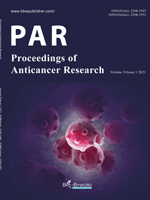Abstract
Objective: To evaluate and comprehensively analyze the clinical efficacy of recombinant human endostatin combined with Iressa targeted therapy in patients with pleural metastasis of lung adenocarcinoma. Methods: The interval of the selected study period span was from January 2017 to April 2021. The sample source of the study was 42 patients with lung adenocarcinoma admitted to hospital. The random number table method was used for study grouping, and they were further divided into study groups (n = 21, 14 cases with pleural metastasis) and control group (n=21, 13 cases with pleural metastasis), all patients received systemic chemotherapy with pemetrexed and cisplatin. Patients with pleural metastases in the control group were injected with 60 mg cisplatin into the thoracic cavity. Patients in the study group were treated with Iressa (gefitinib) targeted therapy if genetic testing showed epidermal growth factor receptor (EGRF) mutations, and patients with pleural metastases were treated with pleural metastasis with Endo (recombinant human endostatin YH-16) to control pleural effusion. Two sets of related indicators were compared and analyzed. Results: Comparing the short-term disease control rate, treatment effectiveness and long-term survival rate between the two groups shows that the study group has more advantages (P<0.05). In the comparison between the two groups of serum markers and related indicators, the study group has more advantages (P<0.05), whereas in the comparison between the two groups in the incidence of adverse reactions, there is no significant difference (P>0.05). Based on statistics of the recurrence rate of pleural fluid in the two groups, the study group is significantly lower than the control group (P<0.05). Conclusion: Recombinant human endostatin combined with Iressa targeted therapy for patients with lung adenocarcinoma with pleural metastasis has significant short-term and long-term effects without serious adverse reactions. It can be fully promoted in medical institutions at all levels.
References
Zheng Y, Hu YQ, Yao JT, et al., 2018, Crizotinib in the Treatment of a Patient with C-MET Amplification Positive Lung Adenocarcinoma Pleural Metastasis and Literature Review. Modern Oncology, 26(22): 3593 -3597.
Qi HH, 2015, The Effect of Oral Gefitinib and Intrathoracic Injection of Lierfan on Advanced Pleural Metastasis Lung Adenocarcinoma. Journal of Practical Cancer, 9: 1308-1310.
Liu BX, Li Y, Ma HB, et al., 2017, Surgical Treatment Effect of Non-Small Cell Lung Cancer with Pleural Metastasis and Spread Found During Operation. Chinese Journal of Thoracic and Cardiovascular Surgery, 33(9): 522-526.
Yang YJ, Zhang XL, Dong YH, et al., 2020, Evaluation Value of Serum Thyroid Transcription Factor 1 Level on The Efficacy of Epidermal Growth Factor Receptor Tyrosine Kinase Inhibitors in the Treatment of Lung Adenocarcinoma. Chinese Medicine, 15(9): 1372-1376.
Shen LL, Lin JX, Wang BL, et al., 2020, Clinical and Genetic Characteristics and Surgical Treatment Effects of Ground-Glass Nodular Lung Adenocarcinoma. Journal of Chinese People’s Liberation Army Medical College, 41(3): 264-268.
Liu N, Yan K, 2019, Analysis of the Correlation Between Changes in Coagulation Function and Tumor Malignancy in Patients with Non-Small Cell Lung Cancer. Chinese Journal of Lung Diseases (Electronic Edition), 12(5): 563-567.
Lin QH, Wu LP, Liu JF, et al., 2019, The Clinical Value of the New Antibody D5F3 Detection in the Pleural Fluid-Based Cytology Wax Block of Patients with Advanced Non-Small Cell Lung Cancer. Fujian Medical Journal, 41(1): 3-5. Cover 3.
Di JN, Liu JY, Zhang L, et al., 2020, EGFR-TKI Targeting Combined with Urokinase for Precise Treatment of Non-Small Cell Lung Cancer with MPE and Review of the Literature. Journal of Jinzhou Medical University, 41(6): 96 -99.
